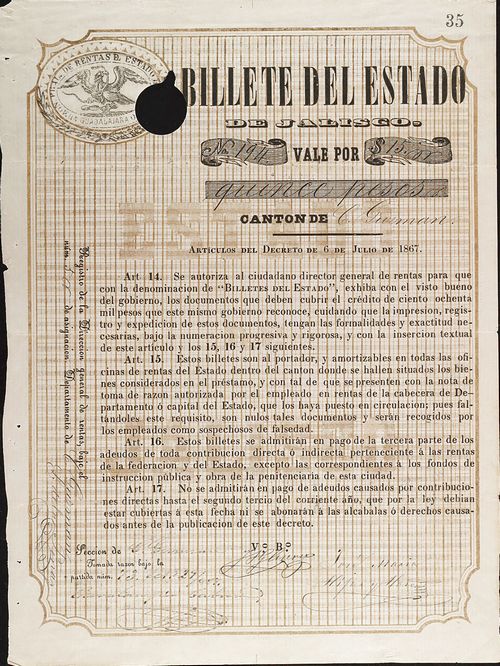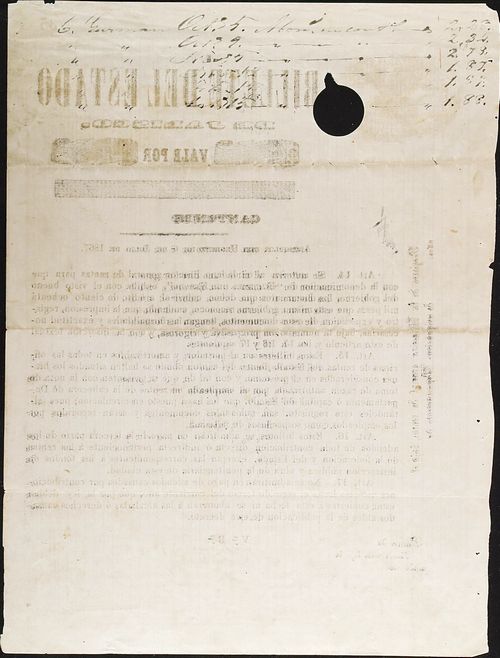Bonos and vales al portador
From 1860 to 1864, when the French were in control of Guadalajara, most public salaries and pensions were no longer paid so that when the Liberal government was restored the oustanding debt was enormous. As soon as the Liberal forces recovered the city, the newly-installed governor, Antonio Gómez Cuervo, proceeded to purchase and sell the goods belonging to the clergy and that had been acquired by private individuals, a situation which provoked disagreements with this Liberal government.

 M34 $15 Billete del Estado
M34 $15 Billete del Estado
A decree of 6 July 1867 authorised the Director General de Rentas to issue $180,000 in "Billetes del Estado", payable to the bearer and redeemable in all the state’s revenue offices in payment of one third of most duties.
In Gomez Cuervo's time the state's debt was gradually being paid in a satisfactory manner, and would eventually have been satisfied. However, the opposition Liga government passed a law on redemption of credits (de bonificación de créditos)[text needed], selling bonos to be used for paying 50% or more of taxes. At first these bonos were sold almost at par, but a short time later it was realised that there were many more than were needed to cover contributions, which were left over in the market and fell in value. Then, a well-known company of speculators, composed of the members of the Liga, bought them at a very low price, e.g. at 6%.
This destroyed the state’s finances. It was impossible to cover the budget and impossible to pay the employees, so they were given vales al portador, which were all but useless and passed at a despicably low price to the same monopolizing company. This caused such an outcry that finally Congress, despite its intimate relationship with the speculators, was forced to pass a law[text needed] prohibiting the issue of vouchers and ordering that all payments were to be made in hard cash. This did not solve the problem, as the employees were given endorsable letters of credit (liquidaciones) which meant the obligations drawn on the treasury varied only in form but not in value. By late 1871 it was said that a system has already been agreed not to pay employees and to speculate with the documents they were given in exchange for their assetsEl Siglo Diez y Nueve, Tomo 53, Núm. 9,749, 17 September 1871. A law of 23 August 1871 on the créditos of pensionistas was considered another form of robbery, as most of the créditos had been bought at 50% of their value or less before the law was published but then redeemed in fullLátigo, Guadalajara, 7 September 1871.
The same happened with the city council, which also had no moneyEl Siglo Diez y Nueve, Tomo 53, Núm. 9,749, 17 September 1871.
It would be necessary to identify some of the resulting documents to determine whether by their nature and format they could be considered paper money.
In 1871 Benito Juárez was re-elected as president but his government was very weak due to the two existing factions among the Liberals: one headed by Sebastián Lerdo de Tejada and the other by General Porfirio Díaz. In Jalisco, the division between Liberals was reflected in the creation of the Liberal Union. headed by Luis L. Vallarta, who became the principal enemy of governor Gómez Cuervo and arranged his impeachment for financial mismanagement, banditry and causing misery among the population. However, Cuervo had the support of General Ramón Corona, who carried out the function of military commander of Jalisco. On Juárez’s death in July 1872, Lerdo de Tejada took over the presidency. Soon a series of disagreements arose in Jalisco between the new governor, Luis L. Vallarta, and President Lerdo de Tejada, due to the difficult economic situation that existed. These disagreements were not resolved until in 1877 Porfirio Díaz’ revolt succeeded and a pro-Vallarta governor was ratified.
